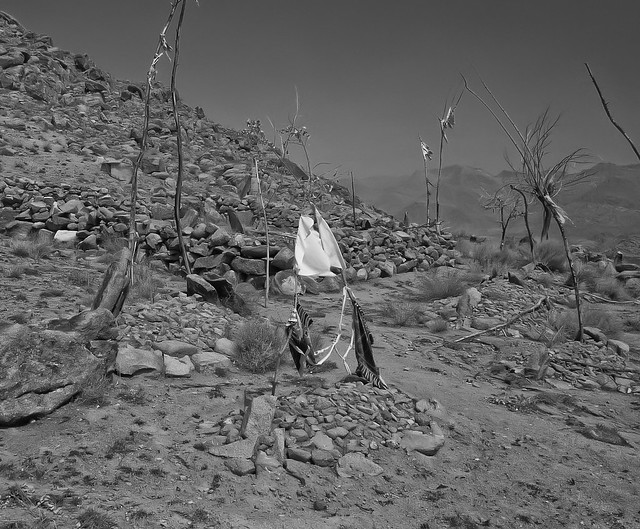I built this model more than a year ago, back when I had an iPhone 3 rather than the iPhone 4 I have now, so the photos of the construction process (at the bottom of this post) are very rough, and there are not too many of them.
The process was very simple:
(1) I used a 1' square vinyl floor tile, which is about 1/8" thick, for the base, trimmed it down to a slightly smaller size, roughed up the edges a bit, though in hindsight perhaps not quite enough -- it seems a bit too straight-edged and not quite "rustic" enough to me now.
(2) I covered the entire base with Elmer's WOOD FILLER. As it was drying I worked in some rough texture and also scattered some small and medium bits of sand, model railway ballast and pebbles, let it dry thoroughly, then brusheded watered-down white glue over everything to strengthen it.
(3) I built the stone wall along the edges of the base, using Woodland Scenics Course Gray Tallus. Truth is the color wasn't important since I knew I would be covering everything with paint when I reached the next step! The exact height of the wall is a matter of personal preference. My walls averaged 3 stones high, a bit more or less in some spots. DON'T FORGET TO LEAVE GAPS FOR AT LEAST ONE AND POSSIBLY SEVERAL CEMETERY ENTRANCES/EXITS! Unfortunately I did forget one of the three I wanted and had to pry apart one length of wall and redo it, but it was worth it in the end!
(4) When the walls had all solidly dried together, I painted the entire piece in Delta Ceramcoat WALNUT -- a very dark, earthy brown. I don't remember for sure but I believe it required 2 coats.
(5) Now it's time for DRY-BRUSHING (the one thing I'm pretty good at!) -- I used my trusty Delta shades of MUDSTONE and SANDSTONE on the ground, then used them on the walls and headstones also, then used RAIN GRAY and QUAKER GRAY on the walls and headstones and finally a very light highlight dry-brush coat of LIGHT IVORY.
(6) THE FLAGS: I used small strips of material that I tore to give them a more raggedy look, then painted over in solid GREEN, WHITE, RED and BLACK, as these are the colors primarily used to mark such graves. I started out thinking I'd use the ever-dependable hobby ingredient of toothpicks for flagpoles, but after doing a little trial research, I realized that to get the effect I wanted I would need some taller and thinner poles, so I bought a long narrow gauge piece of bass wood at my local hobby shop. In my opinion the long and thin flagpole somehow adds to the threadbare nature of the cemetery. I mostly used white glue to attach the cloth strips to their poles, but occasionally supplemented it with a drip of super glue for tricky spots.
I built two groupings of banners permanently into the base itself and then made several more on separate small bases, so they could be moved around to make room for troops. These flag bases can also be used as markers for various purposes during a game or to add some color to the presence of Ghazi units, who were sometimes known -- as at Maiwand -- to carry dozens and dozens, even hundreds, of such banners with them into battle. Here's a pic of all the separate flag bases:

Next up is a b&w photo from the late 1950s and some modern photos I used as reference for the project. Some day soon I hope to track down a 19th Century British news magazine illustration that shows a similar view of an Afghan cemetery:





Finally here are a bunch of pics of the cemetery being built, starting at the bottom of this post and working up to here...



















































Great model building - very good indeed sir
ReplyDeleteThank you for taking the time to leave a comment, Duncan, I sincerely appreciate it!
ReplyDeleteIf you're new to my blog you might enjoy checking out my March 26, 2011 post "Building an Afghan/NWF Rocky Hill". You can find it by typing "rocky hill" into the search bar at the upper left, or maybe by clicking on the link I'm going to try to place here now (I've never tried to do this in the "comments" section before so I don't know if it will work!)...
http://maiwandday.blogspot.com/2011/03/building-afghannwf-rocky-hill.html
So lovely
ReplyDelete